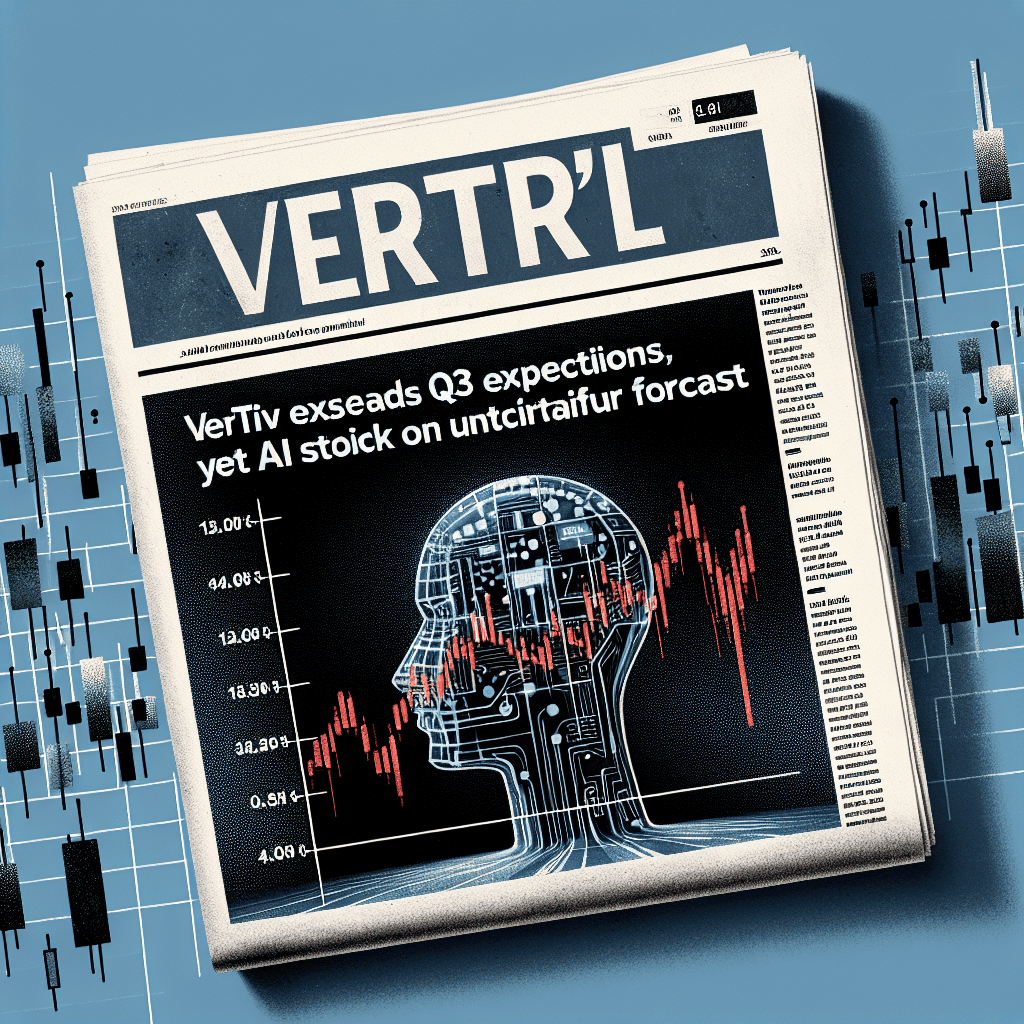“Vertiv Surges Past Q3 Goals, But AI Stock Wavers Amid Forecast Fears”
Introduction
In the third quarter, Vertiv Holdings Co., a global provider of critical digital infrastructure and continuity solutions, reported financial results that surpassed market expectations. Despite this strong performance, the company’s stock experienced a decline, primarily due to uncertainties surrounding its future outlook. Investors expressed concerns over the company’s ability to sustain its growth trajectory amid fluctuating market conditions and evolving demands in the AI sector. This dip in stock value highlights the market’s cautious stance on Vertiv’s long-term strategic positioning and its capacity to navigate the complexities of the rapidly changing technological landscape.
Vertiv’s Q3 Performance: Analyzing the Factors Behind Exceeding Expectations
In the third quarter of the fiscal year, Vertiv Holdings Co. has reported financial results that have surpassed market expectations, showcasing a robust performance that underscores the company’s strategic initiatives and operational efficiencies. Despite this impressive achievement, the company’s stock experienced a dip, primarily due to uncertainties surrounding its future forecasts, particularly in the realm of artificial intelligence (AI). This juxtaposition of strong quarterly results and a cautious outlook presents a complex narrative for investors and analysts alike.
To begin with, Vertiv’s Q3 performance was bolstered by a combination of factors, including increased demand for its critical digital infrastructure and services. The company, which specializes in providing equipment and services for data centers, communication networks, and commercial and industrial facilities, has benefited from the ongoing digital transformation across various sectors. As businesses continue to expand their digital capabilities, the need for reliable and efficient infrastructure has become paramount, driving demand for Vertiv’s offerings. This trend has been further accelerated by the global shift towards remote work and the growing reliance on cloud-based services, both of which have contributed to the company’s strong financial performance.
Moreover, Vertiv’s strategic focus on innovation and customer-centric solutions has played a significant role in exceeding market expectations. By investing in research and development, the company has been able to introduce cutting-edge products and services that meet the evolving needs of its clients. This commitment to innovation has not only enhanced Vertiv’s competitive edge but has also enabled it to capture a larger share of the market. Additionally, the company’s efforts to streamline operations and improve cost efficiencies have resulted in improved profit margins, further contributing to its impressive Q3 results.
However, despite these positive developments, Vertiv’s stock experienced a decline following the release of its quarterly earnings. This downturn can be attributed to the company’s cautious outlook regarding its future performance, particularly in relation to the AI sector. While AI presents significant growth opportunities, it also poses challenges and uncertainties that have raised concerns among investors. The rapid pace of technological advancements in AI, coupled with the competitive landscape, has made it difficult for companies to accurately forecast future growth and profitability. As a result, Vertiv’s conservative guidance has led to a degree of apprehension in the market, impacting its stock performance.
Furthermore, the broader economic environment has also contributed to the uncertainty surrounding Vertiv’s future prospects. With ongoing geopolitical tensions, fluctuating currency exchange rates, and potential regulatory changes, the macroeconomic landscape remains unpredictable. These factors have the potential to influence Vertiv’s operations and financial performance, adding another layer of complexity to its future outlook.
In conclusion, while Vertiv’s Q3 performance has exceeded expectations, the company’s stock has been affected by uncertainties related to its future forecasts, particularly in the AI domain. The strong quarterly results highlight Vertiv’s ability to capitalize on current market trends and its commitment to innovation and operational efficiency. However, the cautious outlook reflects the challenges and uncertainties that lie ahead, both within the AI sector and the broader economic environment. As Vertiv navigates these complexities, its ability to adapt and respond to changing market dynamics will be crucial in determining its long-term success and investor confidence.
Understanding the Market Reaction: Why AI Stocks Dipped Despite Vertiv’s Strong Q3
In the ever-evolving landscape of technology and finance, the performance of companies like Vertiv often serves as a bellwether for broader market trends, particularly in the realm of artificial intelligence (AI). Recently, Vertiv reported its third-quarter earnings, which exceeded market expectations, showcasing robust growth and operational efficiency. Despite this positive financial performance, AI stocks, including Vertiv’s, experienced a dip, leaving investors and analysts pondering the underlying causes of this seemingly paradoxical market reaction.
To understand this phenomenon, it is essential to first consider the broader context in which these events unfolded. Vertiv’s strong Q3 results were driven by increased demand for its data center infrastructure solutions, a sector that has been buoyed by the rapid expansion of cloud computing and AI technologies. The company’s ability to capitalize on these trends by optimizing its supply chain and enhancing its product offerings has been commendable. However, the market’s response to these results was not as straightforward as one might expect.
One of the primary reasons for the dip in AI stocks, despite Vertiv’s impressive performance, lies in the uncertain forecast for the AI industry as a whole. While AI continues to be a transformative force across various sectors, the market is grappling with concerns about regulatory challenges, ethical considerations, and the sustainability of current growth rates. These factors contribute to a climate of uncertainty, which can overshadow even the most positive quarterly earnings reports.
Moreover, investor sentiment is often influenced by forward-looking statements and guidance provided by companies. In Vertiv’s case, while the Q3 results were strong, the company’s cautious outlook for the coming quarters may have tempered investor enthusiasm. This cautiousness is not unfounded, as the AI industry faces potential headwinds, including geopolitical tensions, supply chain disruptions, and evolving regulatory landscapes. Such factors can create a sense of apprehension among investors, leading to a more conservative approach to AI stocks.
Additionally, the broader economic environment plays a crucial role in shaping market reactions. With concerns about inflation, interest rate hikes, and global economic slowdowns, investors are increasingly risk-averse. In such a climate, even sectors with strong growth potential, like AI, can experience volatility as investors seek safer havens for their capital. This risk aversion can lead to sell-offs in stocks perceived as more speculative or vulnerable to external shocks, including those in the AI sector.
Furthermore, the competitive landscape within the AI industry is intensifying, with numerous players vying for market share and technological supremacy. This competition can lead to pricing pressures and margin compression, which may weigh on investor confidence. As companies like Vertiv navigate this competitive environment, their ability to maintain profitability and market leadership becomes a focal point for investors.
In conclusion, while Vertiv’s Q3 performance was undoubtedly strong, the dip in AI stocks can be attributed to a confluence of factors, including industry uncertainties, cautious forward guidance, macroeconomic concerns, and competitive pressures. Understanding these dynamics is crucial for investors seeking to navigate the complexities of the AI market. As the industry continues to evolve, staying informed about these multifaceted influences will be key to making informed investment decisions.
The Role of Forecasting in Stock Market Volatility: A Case Study of Vertiv
In the ever-evolving landscape of the stock market, forecasting plays a pivotal role in shaping investor sentiment and influencing stock prices. The recent case of Vertiv, a company that exceeded its third-quarter expectations, yet saw its AI stock dip due to an uncertain forecast, serves as a compelling example of this phenomenon. Understanding the intricacies of forecasting and its impact on market volatility is essential for investors and analysts alike.
Vertiv, a global provider of critical digital infrastructure and continuity solutions, reported impressive third-quarter results that surpassed market expectations. The company’s robust performance was driven by strong demand for its products and services, reflecting its strategic positioning in a rapidly growing industry. Despite these positive results, Vertiv’s AI stock experienced a decline, highlighting the complex relationship between financial performance and market perception.
One of the primary reasons for this paradoxical stock movement lies in the company’s forward-looking statements. While Vertiv’s current performance was commendable, its forecast for the upcoming quarters introduced a degree of uncertainty that unsettled investors. This uncertainty was primarily attributed to potential challenges in supply chain management and fluctuating market conditions, which could impact future earnings. Consequently, despite the strong quarterly performance, the market reacted to the forecast with caution, leading to a dip in the stock price.
This scenario underscores the critical role of forecasting in stock market volatility. Forecasts provide investors with insights into a company’s future prospects, influencing their investment decisions. A positive forecast can bolster investor confidence, driving stock prices upward, while an uncertain or negative forecast can have the opposite effect. In Vertiv’s case, the uncertainty surrounding its future performance overshadowed its current achievements, illustrating how forecasts can sometimes weigh more heavily on investor sentiment than actual financial results.
Moreover, the Vertiv case highlights the inherent challenges in forecasting, particularly in industries subject to rapid technological advancements and external disruptions. Companies like Vertiv, which operate in the tech-driven sector of digital infrastructure, must navigate a complex web of variables that can impact their forecasts. These include technological innovations, regulatory changes, and global economic shifts, all of which can introduce volatility into their projections. As a result, even well-founded forecasts can be met with skepticism if they fail to account for these dynamic factors.
In addition to the challenges of forecasting, the Vertiv case also emphasizes the importance of effective communication with investors. Companies must strike a delicate balance between transparency and caution when presenting their forecasts. Providing too much detail can expose them to scrutiny, while offering too little can lead to speculation and uncertainty. Vertiv’s experience serves as a reminder that clear and strategic communication is essential in managing investor expectations and mitigating market volatility.
In conclusion, the case of Vertiv illustrates the profound impact that forecasting can have on stock market volatility. While the company’s strong third-quarter performance was noteworthy, the uncertain forecast introduced a level of unpredictability that influenced investor sentiment and led to a dip in its AI stock. This case study highlights the complexities of forecasting in a rapidly changing market environment and underscores the need for companies to communicate effectively with investors. As the stock market continues to evolve, understanding the role of forecasting will remain crucial for navigating its inherent volatility.
Investor Sentiment and AI Stocks: Lessons from Vertiv’s Q3 Results

In the ever-evolving landscape of technology and investment, the performance of companies like Vertiv often serves as a bellwether for broader market trends, particularly in the realm of artificial intelligence (AI). Recently, Vertiv reported its third-quarter results, which exceeded market expectations, showcasing robust growth and operational efficiency. Despite this positive financial performance, the company’s stock experienced a dip, primarily due to an uncertain forecast related to its AI segment. This paradox highlights the complex dynamics of investor sentiment and the unique challenges faced by companies operating in the AI sector.
Vertiv’s third-quarter results were impressive, with the company reporting higher-than-expected revenue and profit margins. This success can be attributed to its strategic focus on optimizing its core operations and expanding its product offerings. The company’s ability to adapt to changing market demands and leverage its technological expertise has been instrumental in driving its growth. However, while these results were a testament to Vertiv’s operational strength, they were overshadowed by concerns about the future trajectory of its AI initiatives.
The AI sector, characterized by rapid innovation and intense competition, presents both opportunities and uncertainties for companies like Vertiv. Investors are keenly aware of the potential for AI to revolutionize industries and generate substantial returns. However, they are equally cognizant of the risks associated with technological advancements that may not materialize as quickly as anticipated. In Vertiv’s case, the company’s cautious outlook for its AI segment raised questions about its ability to capitalize on emerging opportunities in this space.
This cautious forecast was primarily driven by several factors, including the pace of AI adoption across industries and the evolving regulatory landscape. While AI holds immense promise, its integration into existing systems and processes is often fraught with challenges. Companies must navigate complex technical, ethical, and legal considerations, which can impede the speed of AI deployment. Vertiv’s management acknowledged these hurdles, emphasizing the need for a measured approach to AI investments.
The reaction of investors to Vertiv’s forecast underscores the importance of clear communication and strategic foresight in managing market expectations. While the company’s strong financial performance should have bolstered investor confidence, the ambiguity surrounding its AI strategy led to a decline in stock value. This scenario serves as a reminder that, in the realm of AI stocks, investor sentiment is heavily influenced by perceptions of future growth potential and the ability to effectively manage risks.
Moreover, Vertiv’s experience highlights the broader lessons for companies operating in the AI sector. It is crucial for these companies to strike a balance between pursuing innovation and maintaining transparency with investors. By clearly articulating their strategic vision and addressing potential challenges, companies can foster trust and mitigate the impact of market volatility.
In conclusion, Vertiv’s third-quarter results offer valuable insights into the intricate relationship between investor sentiment and AI stocks. While the company’s financial performance exceeded expectations, the uncertain forecast for its AI segment led to a dip in stock value. This outcome underscores the need for companies to navigate the complexities of the AI landscape with strategic clarity and effective communication. As the AI sector continues to evolve, these lessons will be essential for companies seeking to harness the transformative potential of artificial intelligence while managing investor expectations.
Navigating Uncertainty: How Vertiv’s Q3 Success Highlights Forecasting Challenges
In the ever-evolving landscape of technology and business, Vertiv’s recent performance in the third quarter has captured significant attention. The company, known for its critical digital infrastructure and continuity solutions, has managed to exceed market expectations, showcasing robust growth and operational efficiency. However, despite this commendable achievement, Vertiv’s stock in the artificial intelligence (AI) sector has experienced a dip, primarily due to an uncertain forecast that has left investors wary. This juxtaposition of success and skepticism underscores the complexities inherent in navigating the unpredictable waters of technological advancement and market dynamics.
To begin with, Vertiv’s third-quarter results have been nothing short of impressive. The company reported a substantial increase in revenue, driven by strong demand for its products and services. This growth can be attributed to Vertiv’s strategic focus on innovation and its ability to adapt to the rapidly changing needs of its clients. By investing in cutting-edge technologies and expanding its global footprint, Vertiv has positioned itself as a leader in the digital infrastructure space. Consequently, the company’s financial performance has not only met but exceeded analysts’ expectations, reflecting its resilience and strategic acumen.
Nevertheless, despite these positive results, Vertiv’s AI stock has faced a downturn, a development that can be attributed to the company’s cautious outlook for the future. While the AI sector holds immense potential, it is also fraught with uncertainties that can impact investor confidence. Vertiv’s management has highlighted several challenges that could affect future growth, including supply chain disruptions, fluctuating demand patterns, and the ever-present threat of technological obsolescence. These factors have contributed to a more conservative forecast, which, in turn, has led to a decline in stock value.
Moreover, the broader market environment has also played a role in shaping investor sentiment. The technology sector, particularly AI, is characterized by rapid innovation and intense competition. Companies are under constant pressure to deliver groundbreaking solutions while managing costs and maintaining profitability. In such a volatile landscape, even a slight hint of uncertainty can trigger significant market reactions. Vertiv’s cautious forecast, therefore, serves as a reminder of the inherent risks associated with investing in high-growth sectors like AI.
In light of these developments, it is crucial for investors and stakeholders to adopt a balanced perspective. While short-term fluctuations in stock prices can be unsettling, they do not necessarily reflect the long-term potential of a company. Vertiv’s strong third-quarter performance is indicative of its ability to navigate challenges and capitalize on opportunities. By maintaining a focus on innovation and operational excellence, the company is well-positioned to weather the uncertainties that lie ahead.
In conclusion, Vertiv’s recent experience highlights the dual nature of success and uncertainty in the technology sector. While the company’s impressive third-quarter results demonstrate its capability and strategic foresight, the dip in AI stock underscores the challenges of forecasting in an unpredictable market. As Vertiv continues to chart its course in the digital infrastructure space, it serves as a testament to the importance of resilience and adaptability in the face of uncertainty. Investors, therefore, would do well to consider both the immediate challenges and the long-term potential that Vertiv represents in the ever-changing world of technology.
The Impact of Economic Forecasts on AI Stock Performance: Insights from Vertiv
In the ever-evolving landscape of technology and finance, the performance of AI stocks often serves as a barometer for broader economic trends. Recently, Vertiv, a prominent player in the field, reported its third-quarter earnings, which exceeded market expectations. Despite this positive financial performance, the company’s AI stock experienced a dip, underscoring the complex interplay between economic forecasts and stock market behavior. This phenomenon highlights the intricate dynamics that investors must navigate when assessing the potential of AI-related investments.
To begin with, Vertiv’s impressive third-quarter results were driven by robust demand for its data center infrastructure solutions. The company’s ability to capitalize on the growing need for efficient and reliable data management systems has positioned it as a leader in the industry. As businesses increasingly rely on digital infrastructure, Vertiv’s offerings have become indispensable, leading to a surge in revenue and profitability. This success, however, was not enough to shield its AI stock from the vagaries of market sentiment.
The decline in Vertiv’s AI stock can be attributed to a confluence of factors, chief among them being the uncertain economic forecast. Investors are acutely aware that the global economic landscape is fraught with challenges, ranging from geopolitical tensions to inflationary pressures. These uncertainties have cast a shadow over the tech sector, prompting investors to adopt a cautious stance. Consequently, even companies like Vertiv, which demonstrate strong financial performance, are not immune to the broader market apprehensions.
Moreover, the AI sector, while promising, is inherently volatile. The rapid pace of technological advancements means that companies must continuously innovate to maintain their competitive edge. This relentless pursuit of innovation often requires substantial investment, which can strain financial resources and impact short-term profitability. Investors, therefore, remain vigilant, scrutinizing not only current performance but also future growth prospects. In Vertiv’s case, while the company has shown resilience, concerns about its ability to sustain growth in an unpredictable economic environment have contributed to the dip in its AI stock.
Furthermore, the market’s reaction to Vertiv’s forecast reflects a broader trend where investors are increasingly prioritizing long-term stability over short-term gains. The AI sector, characterized by its potential for transformative impact, is also subject to regulatory scrutiny and ethical considerations. As governments and organizations grapple with the implications of AI deployment, companies must navigate a complex regulatory landscape. This adds another layer of uncertainty, influencing investor sentiment and stock performance.
In light of these factors, it becomes evident that the performance of AI stocks is not solely determined by a company’s financial results. Instead, it is a reflection of a myriad of influences, including economic forecasts, market sentiment, and the broader regulatory environment. For investors, this underscores the importance of a nuanced approach when evaluating AI-related investments. While companies like Vertiv may demonstrate strong fundamentals, the external environment plays a crucial role in shaping stock performance.
In conclusion, Vertiv’s experience serves as a microcosm of the challenges and opportunities inherent in the AI sector. As the company continues to navigate an uncertain economic landscape, its stock performance will likely remain subject to fluctuations driven by both internal achievements and external factors. For investors, understanding the impact of economic forecasts on AI stock performance is essential for making informed decisions in this dynamic and rapidly evolving field.
Strategic Takeaways for Investors: Learning from Vertiv’s Q3 and AI Stock Trends
In the ever-evolving landscape of technology and investment, Vertiv’s recent performance in the third quarter has provided a wealth of insights for investors seeking to navigate the complexities of the market. Vertiv, a global provider of critical digital infrastructure and continuity solutions, has exceeded expectations in its Q3 earnings report, showcasing robust growth and operational efficiency. Despite this positive performance, the company’s stock, along with other AI-related stocks, has experienced a dip, primarily due to an uncertain forecast. This juxtaposition of strong results and market volatility offers strategic takeaways for investors aiming to make informed decisions.
To begin with, Vertiv’s Q3 results underscore the importance of operational excellence and strategic positioning in the technology sector. The company reported a significant increase in revenue, driven by strong demand for its products and services. This growth can be attributed to Vertiv’s ability to adapt to the increasing need for reliable digital infrastructure, a trend that has been accelerated by the global shift towards digitalization. Investors can glean from this that companies with a clear focus on meeting emerging market demands are likely to perform well, even amidst broader economic uncertainties.
However, the dip in Vertiv’s stock, despite its strong quarterly performance, highlights the market’s sensitivity to future forecasts and broader economic signals. The uncertainty surrounding AI stocks, including Vertiv’s, can be linked to several factors, such as regulatory challenges, competitive pressures, and the unpredictable pace of technological advancements. This serves as a reminder to investors that while past performance is a valuable indicator, it is equally crucial to consider forward-looking statements and potential risks. Diversification and a keen eye on industry trends can help mitigate the impact of such volatility.
Moreover, the current trends in AI stocks reflect a broader narrative within the technology sector. As AI continues to evolve, companies are grappling with the dual challenge of innovation and regulation. The rapid pace of AI development has led to increased scrutiny from regulators, which in turn affects investor sentiment. For investors, this means that staying informed about regulatory developments and understanding their potential impact on AI companies is essential. By doing so, they can better assess the long-term viability and growth potential of their investments.
In addition to regulatory considerations, competitive dynamics within the AI space are also influencing stock performance. The race to develop cutting-edge AI solutions has intensified, with numerous players vying for market leadership. This competitive environment can lead to increased volatility as companies invest heavily in research and development, sometimes at the expense of short-term profitability. Investors should therefore evaluate a company’s strategic initiatives and its ability to maintain a competitive edge in a crowded market.
In conclusion, Vertiv’s Q3 performance and the subsequent dip in its stock, along with other AI stocks, offer valuable lessons for investors. The importance of operational excellence, awareness of market trends, and a comprehensive understanding of regulatory and competitive landscapes cannot be overstated. By integrating these strategic takeaways into their investment approach, investors can better navigate the complexities of the technology sector and position themselves for long-term success. As the market continues to evolve, staying informed and adaptable will be key to capitalizing on emerging opportunities while mitigating potential risks.
Q&A
1. **What company is the article about?**
Vertiv.
2. **What financial period is being discussed?**
The third quarter (Q3).
3. **Did Vertiv meet or exceed expectations for Q3?**
Vertiv exceeded expectations for Q3.
4. **What happened to Vertiv’s stock despite exceeding expectations?**
The stock dipped.
5. **What is the reason for the stock dip?**
Uncertain forecast.
6. **Is AI mentioned in the context of the stock dip?**
Yes, AI is mentioned in the context of the stock dip.
7. **What is the general sentiment about Vertiv’s future performance?**
The sentiment is uncertain due to the forecast.
Conclusion
Vertiv’s strong performance in the third quarter, surpassing market expectations, highlights the company’s operational efficiency and robust demand for its products. However, despite these positive results, the dip in AI-related stock reflects investor concerns over the company’s uncertain future outlook. This uncertainty may stem from broader market volatility, potential supply chain disruptions, or evolving competitive dynamics in the AI sector. Consequently, while Vertiv’s current achievements are commendable, the market’s cautious stance underscores the need for clear strategic direction and adaptability to sustain long-term growth and investor confidence.





